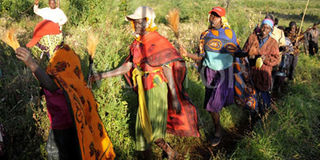Prime
Leaders champion fight against FGM

Candidates being prepared for Female Genital Mutilation in Sebei Sub-region. Photo | File
What you need to know:
- They are engaging in efforts to raise awareness, involve communities, and provide support to combat this harmful practice, particularly in remote areas.
Leaders in Sebei sub-region are optimistic that sustained efforts will soon consign Female Genital Mutilation (FGM) to history, particularly in remote areas where isolated cases persist.
Kween Resident District Commissioner ASP (rtd) Hope Atuhaire tasked the boys to be involved in the fight to eradicate the vice, which was outlawed by the government in 2010.
“We have people doing the vice secretly in places such as Kaptum, and Tukumo in Binyiny Town Council. I call upon the boys to get involved and protect the girls,” she said.
She made the remarks during the launch of the SAIDA Safe Club during the commemoration of the International Day for Zero Tolerance of FGM in Kween District on Tuesday.
Ms Atuhaire outlined the district’s comprehensive approach, including mapping out areas where FGM is suspected.
“We engage every stakeholder. It’s a Frontline war. Nobody should be left behind. I am going to arrest anyone involved in perpetuating FGM in the district,” she said.
The RDC also tasked religious leaders to preach against FGM in their respective areas of jurisdiction.
Mr Twoyem Stephen, the headmaster of Kere Primary School, identified a forest in Katum Sub-county where he said the practice is done at night, particularly targeting young girls aged 9 to 10 years.
Mr Ben Musobo, the chairperson of Tulwo Village in Bukwo District, called for government support for community groups engaged in grassroots sensitisation efforts against FGM in hotspot sub-counties.
However, Mr Sam Kapmwasir, one of the elders and resident of Tulwo cell in Riwo Town Council, said continuous FGM practice is a sign of its deep-rooted culture.
“FGM is a deep-rooted culture. The people don’t even fear arrests and imprisonment but with time, the practice is waning out,” Mr Kapmwasir said.
Kween youth councillor, Mr Sam Baramas, said they embarked on a campaign as youth to fight FGM and uphold education.
The Msichana Uganda organisation director, Ms Winfred Nakandi, said school dropout rate is still high in Kween, something she said contributes to FGM cases in the area.
“As Msichana organisation, we are giving out pads that can be used for two years. Our aim is also to keep girls at school,” she said.
Projects
Under the “Pad Every Girl” project, Msichana Uganda has distributed reusable sanitary pads to over 250 girls, incorporating FGM eradication efforts with support from SAIDA International.
Ms Nakandi said they are empowering girls to become peer educators and drive community awareness against FGM.
Ms Judith Chepkwoti, the head teacher of Kwosir Girls School, which is now being turned into a mixed school, said they need to involve students in the fight against FGM.
“Our analysis shows that the boys and girls are instrumental in the fight against FGM and so they should be involved and also kept in schools,” she said.
The school was commissioned by the First Lady, Ms Janet Museveni, in 2013 to act as a shelter and end FGM in Sebei.




